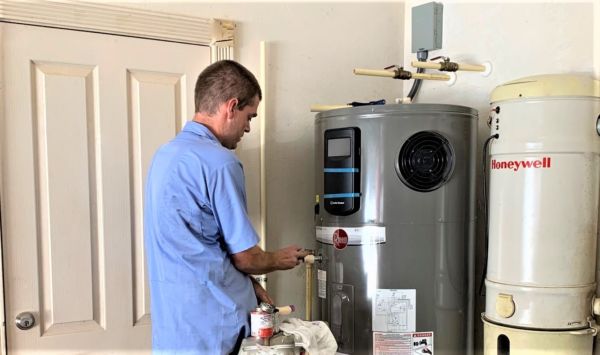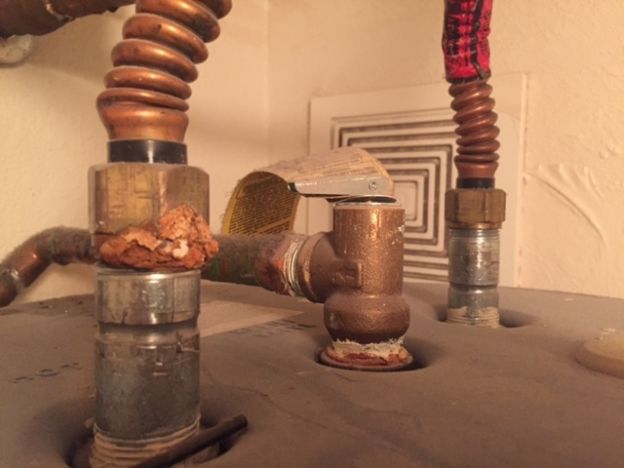Why is My Water Heater Leaking?
December 15, 2020

If you recently noticed that your water heater was leaking, you’re probably wondering why.
But in order to get to the “why” of the leak, you have to first identify where the leak is coming from.
Four of the most common locations a water heater leak could occur include:
The tank
Drain valve
Pressure relief valve
Inlet/outlet connection
Below, we’ll look at each of these leak locations in more detail, so you can get a better understanding of why your water heater is leaking and what you can do about it.
Think you may need to replace your water heater altogether? We can help with that. Learn more about the tank water heater installation services we offer or…
Leak Location #1: The tank
Unfortunately, if your water heater tank itself is leaking, you will need to replace your entire water heater.
Typically, water heater tanks leak due to average wear and tear over time. If the tank of your water heater is leaking, that’s usually a sign that your water heater is older and needs to be replaced anyway.
There are a few reasons water heater tanks leak due to old age, including:
Sediment build up- Sediment builds up over time on the bottom of your water heater. Eventually, that sediment can corrode the tank itself.
Stress fractures- When your water heater heats water, pressure builds in the tank and expands the size of the tank slightly. After years of constantly expanding and contracting, your water heater’s tank can develop stress fractures which can cause leaks.
Rust- Because your water heater tank is constantly full of water, over time it can start to rust from the inside, which can cause leaks.
As we mentioned above, if your tank is leaking, the only solution is to replace your entire water heater.
Leak Location #2: Drain valve
If you notice water leaking from your drain valve, there are two likely explanations:
The valve has worn out — The seal of a drain valve wears out over time. When it does, it allows a small amount of water to leak out. If this is your issue, you can simply drain your water heater, replace the drain valve and seal, and your leak should be fixed.
The valve is not fully closed — If you recently had your water heater maintained and you notice your valve is leaking, it’s possible the valve may still be slightly open. Try closing the valve completely to see if the leaking stops.
Leak Location #3: Pressure relief valve
The pressure relief valve is a valve that sits on the top of your water heater and releases pressure and water when the pressure inside the tank is too high.
If your pressure relief valve is leaking, there are generally two reasons:
The pressure and/or temperature inside your water heater is too high— If the temperature of the water inside your tank is too high and/or the pressure inside the tank is unsafe, the pressure relief valve will open to let some of that pressure/water out. If you recently serviced your water heater, our suggestion would be to check the temperature. Typically, homeowners should have their water heaters set to around 120 degrees to maintain a safe water temperature and water heater pressure.
There is an issue with your pressure relief valve— Sometimes issues arise with the pressure relief valve itself, which can cause it to release water when there’s no real issue. If you’ve checked your water heater’s temperature and it’s within normal range, there could just be an issue with your pressure relief valve.
Leak Location #4: Inlet/outlet connection

Your tank water heater has an inlet pipe that brings cold water into the heater and an outlet pipe that carries heated water out of your water heater.
Over time, those pipes can become loose or rusted, causing them to leak. Since these pipes sit at the top of your water heater, many times homeowners think the tank of their water heater is leaking when it’s actually leakage from inlet and outlet pipes.
If you notice water dripping from one of these pipes, try tightening the connection with a wrench. If it looks like the connections or the pipes themselves may be rusted out, you may need to drain your water heater and replace one or both of the pipes.
Tank water heater still leaking? Call Advanced Air to replace it!
If your water heater is older or it’s leaking from the tank, you’ll probably need to replace your entire water heater. At Advanced Air, we take the time to help you determine which size water heater is best for your home, hot water needs and budget. This way, you’re confident that you’re getting the best long-term solution for your Southwest Florida home.
- Posted in:
- Plumbing,
- Water Heater

